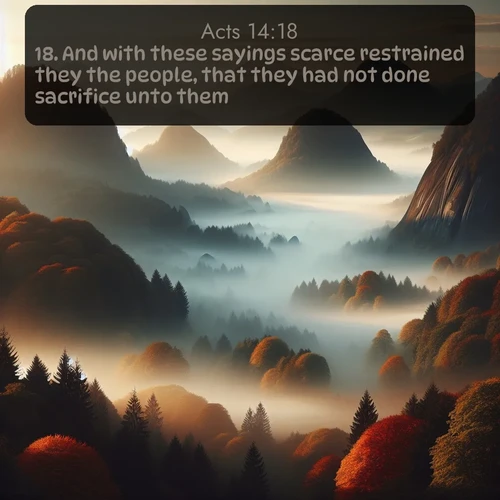Acts 14:18 plusieurs versions / traductions
English Bible Translations
18. And with these sayings scarce restrained they the people, that they had not done sacrifice unto them.
18. And with these sayings scarce restrained they the multitudes from doing sacrifice unto them.
18. And even with these words, it was hard for them to keep the people from making an offering to them.
18. And saying these things, they with difficulty kept the crowds from sacrificing to them.
18. And with these sayings they scarce restrained the people from doing sacrifice to them.
18. and these things saying, scarcely did they restrain the multitudes from sacrificing to them.
German Bible Translations
18. Und da sie das sagten, stillten sie kaum das Volk, daß sie ihnen nicht opferten.
18. Obschon sie solches sagten, konnten sie die Menge kaum beruhigen, daß sie ihnen nicht opferte.
French Bible Translations
18. C'est à peine s'ils purent, par ces paroles, empêcher la foule de leur offrir un sacrifice.
18. A peine purent-ils, par ces paroles, empêcher la foule de leur offrir un sacrifice.
18. A peine purent-ils, par ces paroles, empêcher la foule de leur offrir un sacrifice.
18. Et en disant ces choses, à peine empêchèrent-ils les foules de leur sacrifier.
18. Et en disant ces choses, à peine empêchèrent-ils les troupes de leur sacrifier.
18. Et à peine, en disant cela, purent-ils empêcher le peuple de leur offrir un sacrifice.
Versions with Strong Codes
Acts 14 / KJV_Strong18. And[G2532] with these[G5023] sayings[G3004] scarce[G3433] restrained[G2664] they the[G3588] people,[G3793] that they had not[G3361] done sacrifice[G2380] unto them.[G846]
Strong Code definitions
G2532 kai/kahee apparently, a primary particle, having a copulative and sometimes also a cumulative force; and, also, even, so then, too, etc.; often used in connection (or composition) with other particles or small words:--and, also, both, but, even, for, if, or, so, that, then, therefore, when, yet.
G5023 tauta/tow'-tah nominative or accusative case neuter plural of G3778; these things:-+ afterward, follow, + hereafter, X him, the same, so, such, that, then, these, they, this, those, thus. see G3778
G3004 lego/leg'-o a primary verb; properly, to "lay" forth, i.e. (figuratively) relate (in words (usually of systematic or set discourse; whereas G2036 and 5346 generally refer to an individual expression or speech respectively; while 4483 is properly to break silence merely, and 2980 means an extended or random harangue)); by implication, to mean:--ask, bid, boast, call, describe, give out, name, put forth, say(-ing, on), shew, speak, tell, utter. see G2036 see G5346 see G4483 see G2980
G3433 molis/mol'-is probably by variation for G3425; with difficulty:--hardly, scarce(-ly), + with much work. see G3425
G2664 katapauo/kat-ap-ow'-o from G2596 and 3973; to settle down, i.e. (literally) to colonize, or (figuratively) to (cause to) desist:--cease, (give) rest(-rain). see G2596 see G3973
G3588 ho/ho, including the feminine to to in all their inflections; the definite article; the (sometimes to be supplied, at others omitted, in English idiom):--the, this, that, one, he, she, it, etc.
G3793 ochlos/okh'los from a derivative of G2192 (meaning a vehicle); a throng (as borne along); by implication, the rabble; by extension, a class of people; figuratively, a riot:--company, multitude, number (of people), people, press. see G2192
G3361 me/may a primary particle of qualified negation (whereas G3756 expresses an absolute denial); (adverb) not, (conjunction) lest; also (as an interrogative implying a negative answer (whereas G3756 expects an affirmative one)) whether:--any but (that), X forbear, + God forbid, + lack, lest, neither, never, no (X wise in), none, nor, (can-)not, nothing, that not, un(-taken), without. Often used in compounds in substantially the same relations. See also 3362, 3363, 3364, 3372, 3373, 3375, 3378. see G3756 see G3362 see G3363 see G3364 see G3372 see G3373 see G3375 see G3378
G2380 thuo/thoo'-o a primary verb; properly, to rush (breathe hard, blow, smoke), i.e. (by implication) to sacrifice (properly, by fire, but genitive case); by extension to immolate (slaughter for any purpose):--kill, (do) sacrifice, slay.
G846 autos/ow-tos' from the particle au (perhaps akin to the base of G109 through the idea of a baffling wind) (backward); the reflexive pronoun self, used (alone or in the comparative 1438) of the third person , and (with the proper personal pronoun) of the other persons:--her, it(-self), one, the other, (mine) own, said, (self-), the) same, ((him-, my-, thy- )self, (your-)selves, she, that, their(-s), them(-selves), there(-at, - by, -in, -into, of, -on, -with), they, (these) things, this (man), those, together, very, which. Compare 848. see G109 see G1438 see G848
Prédications qui analysent les thèmes Actes 14
Thèmes : Mission à Icone; Guérison d'un infirme; Opposition et persécution; Retour à AntiocheActes #17: L’apôtre Paul est il un vrai apôtre?
Related Sermons discussing Acts 14
Themes : Mission à Icone; Guérison d'un infirme; Opposition et persécution; Retour à AntiocheActs #18: Religious gestures do not define my salvation
Acts #17: Is the Apostle Paul a true apostle? (Patrice Berger)
see also: Bible Key Verses ; KJV Bible Images, BBE Bible images

